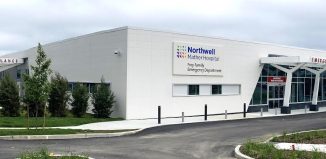North Shore hospitals improving our health care
By Sen. Ken LaValle
Today, we live in a fast-paced society where change is no longer measured year-to-year but is determined in minute-to-minute increments.
By the time we master a new technology or system, it is time to upgrade to the next. Perhaps there is no better example of fast pace change than in the world of health care.
Doctors are now employed by hospitals, hospitals are joining hospital systems and hospital systems are expanding into new geographical areas creating an atmosphere of competition unprecedented in years past.
In this dynamic health care environment, I take great pride in the fact that two of our local hospitals have recognized that by working together, the quality of health care in our community significantly improves. We are fortunate to have Stony Brook Medicine — an outstanding, tertiary care hospital and research-intense medical school, in close proximity to John T. Mather Memorial Hospital — one of our region’s premiere community teaching hospitals.
In years past, a patient oftentimes had to choose between the two hospitals in determining their level of care. Today, the hospitals work together to provide access to quality care and services through state-of-the art technology.
For example, recent clinical research at Stony Brook established a new approach to the definitive diagnosis of cardiac disease in patients with chest pain. Stony Brook then spread this technology to Mather Hospital, so that a patient entering Mather with chest pain has their cardiac CT scan read remotely by doctors at Stony Brook, reducing unnecessary hospital admissions.
Mather has also teamed up with Stony Brook radiologists who read all of the radiology studies, CT, MRI and X-rays, for Mather Hospital patients. The two hospitals have implemented a seamless transfer process for patients with complex medical problems that require services available only at the tertiary care hospital.
For example, patients arriving at Mather Emergency Department with stroke symptoms are rapidly assessed and treated. Those patients who require neurointerventional therapies are transferred to Stony Brook where neurosurgeons can move quickly and remove or break up clots, saving brain tissue and thereby improving brain function following recovery.
On the educational front, Stony Brook currently sponsors the training of internal medicine residents at Mather Hospital, providing a mechanism to attract and maintain quality doctors in the years ahead.
The relationship between Stony Brook Medicine and Mather Hospital demonstrates what can be achieved when institutions make the commitment to reach out and complement each other’s strengths. In this case, the results have brought about improved and more efficient health care services at a cost savings achieved by eliminating duplication.
As we continue to navigate the quickly changing health care landscape and focus more on health management and prevention strategies, I am hopeful that opportunities for collaboration and cooperation continue to grow and that our local hospitals find new and innovative ways to provide residents with the best possible health care close to home.
Senator Ken LaValle (R-Port Jefferson) is a member of the New York State Senate, representing the First District.






